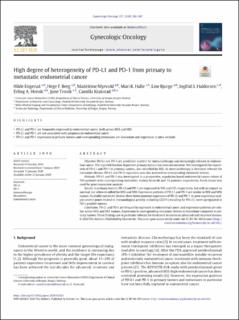High degree of heterogeneity of PD-L1 and PD-1 from primary to metastatic endometrial cancer
Engerud, Hilde Renate; Berg, Hege Fredriksen; Myrvold, Madeleine; Halle, Mari Kyllesø; Bjørge, Line; Haldorsen, Ingfrid S.; Høivik, Erling Andre; Trovik, Jone; Krakstad, Camilla
Journal article, Peer reviewed
Published version

Åpne
Permanent lenke
https://hdl.handle.net/11250/2740514Utgivelsesdato
2020Metadata
Vis full innførselSamlinger
- Department of Clinical Science [2318]
- Registrations from Cristin [9791]
Sammendrag
Objective
PD-L1 and PD-1 are predictive markers for immunotherapy and increasingly relevant in endometrial cancer. The reported fraction of positive primary tumors has been inconsistent. We investigated the expression of PD-L1 and PD-1 in primary tumors, also stratified by MSI. As immunotherapy is foremost relevant for metastatic disease, PD-L1 and PD-1 expression was also assessed in corresponding metastatic lesions.
Methods
PD-L1 and PD-1 was investigated in a prospective, population based endometrial cancer cohort of 700 patients with corresponding metastatic lesions from 68 and 74 patients respectively. Fresh tissue was used for gene expression analysis.
Results
In primary tumors, PD-L1 and PD-1 are expressed in 59% and 63%, respectively, but with no impact on survival, nor when stratified for MSS and MSI. Expression patterns of PD-L1 and PD-1 are similar in MSI and MSS tumors. Available metastatic lesions show heterogeneous expression of PD-L1 and PD-1. In gene expression analysis several genes related to immunological activity, including CD274 (encoding for PD-L1), were upregulated in PD-1 positive tumors.
Conclusion
PD-L1 and PD-1 are frequently expressed in endometrial cancer and expression patterns are similar across MSS and MSI tumors. Expression in corresponding metastatic lesions is discordant compared to primary tumors. These findings are in particular relevant for treatment decisions in advanced and recurrent disease.
